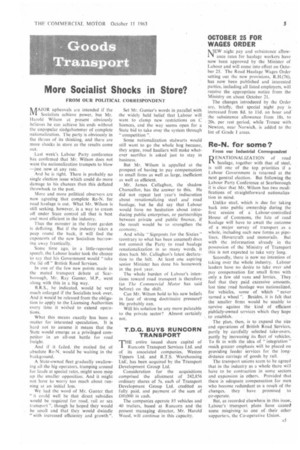Re-N. for some?
Page 7

If you've noticed an error in this article please click here to report it so we can fix it.
From our Industrial Correspondent
DENATIONALIZATION of road IX haulage, together with that of steel, is still one of the top priorities if a Labour Government is returned at the next general election. But following the Labour Party Conference at Scarborough it is clear that Mr. Wilson has two modifications of straightforward nationalization in mind.
Unlike steel, which is due for taking back into public ownership during the first session of a Labour-controlled House of Commons, the fate of road haulage will have to await the outcome of a major survey of transport as a whole, including such new forms as pipelines, Hovercraft and monorails. But with the information already in the possession of the Ministry of Transport this is not expected to take very long.
Secondly, there is now no intention of taking over the whole industry. Labour leaders have no desire to take over and pay compensation for small firms with only a few old vans and lorries., They feel that they paid excessive amounts, last time road haulage was nationalized, for vehicles, some of which "never turned a wheel ". Besides, it is felt that the smaller firms would be unable to survive against •the kind of efficient publicly-owned services which they hope to establish.
The plan, then, is to expand the size and operations of British Road Services, partly by carefully selected take-overs, partly by increasing its fleet of vehicles. To fit in with the idea of " integiation " much greater emphasis will be placed on providing feeder Services for the longdistance carriage of goods by rail.
The transport unions seem to he agreed that in the industry as a whole there will have to be contraction in some sectors and expansion in others. Provided that there is adequate compensation for men who become redundant as a result of the changes, they have promised to co-operate.
But, as recorded elsewhere in this issue, Labour's transport plans have caused some misgiving to one of their other supporters, the Co-operative Union.




















































































































